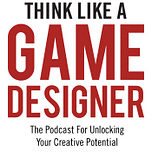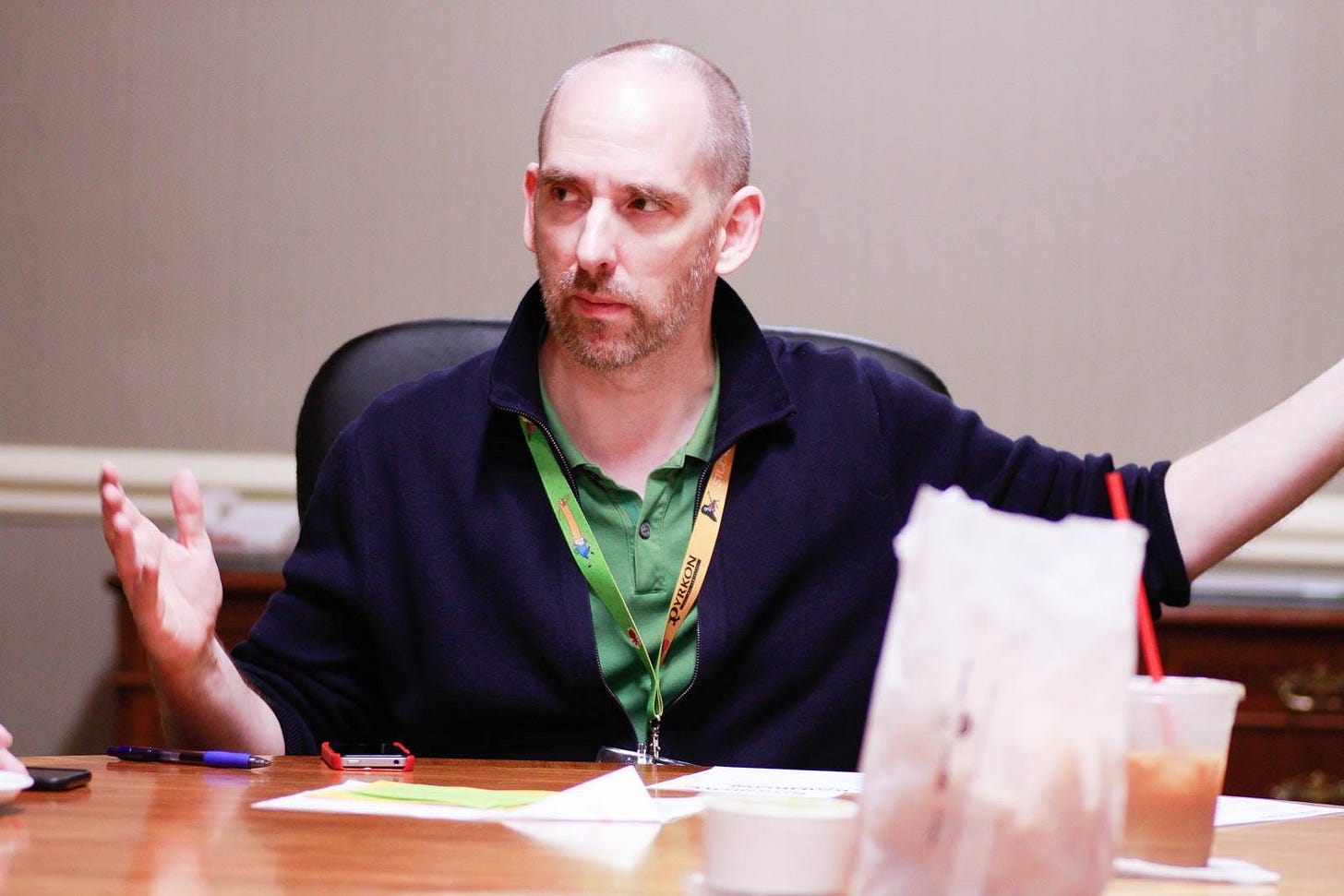About Jason Morningstar
Jason Morningstar, a trailblazer in role-playing game design, chats with us about his journey from passionate gamer to the mastermind behind innovative and award-winning RPGs like Fiasco, Night Witches, and Desperation. His work on Fiasco (among the 40+ games he’s designed) is a testament to his ability to craft games that offer unique emotional experiences. Join us for an intriguing discussion about pushing the boundaries of RPGs, the interplay between game design and culture, and the art of making games that matter. Tune-in to get into the mind of a game designer who's been changing the rules of the game since the day he started.
Want to support the podcast and get more design lessons?
Paying subscribers enjoy an abundance of extra game design content and an exclusive newsletter with new lessons, archive access, videos, and more! By opting for a free or paid subscription, you can get the latest articles delivered to your inbox and support this podcast!
Ah-ha! Justin’s Takeaways
Use cheating as a benchmark: Jason says, “If your playtesters are cheating at your game, it means they are really engaged.” This was a complete 180 for me—I'll never look at players who cheat at my games the same way again.
“Don't lose money” as a company philosophy. It sounds straightforward, but Jason's company takes this to heart, often choosing slow growth over risking a lot for big wins. It's about making tough calls, like passing up flashy opportunities for steady, small victories. Man, I wish someone had drilled this into me a decade ago.
Designing for the Culture of Play. Every group of gamers brings their own experiences and expectations, and you can't please them all. Jason and I spoke about how tweaking your game's theme, message, and marketing can attract the kind of players you want—and maybe even nudge the gaming culture to explore the message built into the game. It's also important to remember that you don't need to design for every play group’s culture; make sure you serve the right ones well and communicate so that interested groups can find your game and others who aren’t interested can avoid your game.
Show Notes
Cooking Up Games (00:00:00 - 00:13:22)
“Game design is an applied art, and if you can’t help but do it, then it’s an avenue of expression that you need to explore.”
We start with Jason's origin story, uncovering his roots in a family passionate about tabletop gaming, leading him naturally towards role-playing games. His journey into professional game design began with his participation in the “game chef” contests, which challenge contestants to craft a tabletop RPG using specific “ingredients.” Encouraged by industry professionals about publishing, he co-founded a company and printed 100 copies of his own game. It’s a testament to how important that first person who believes in you can be. So, if you’re an established designer or publisher reading this—remember to support and encourage the designers you meet!
Games as Self-Expression (00:13:22 - 00:24:40)
“For sure, my games are about things that I need to talk about, share with people, or feelings that I need to express. Sometimes they come from anger or confusion, or just something people need to think about more.”
Exploring game design as an applied art and medium of personal expression, we discuss how the mechanics and themes of games reflect the designer's identity and worldview. Jason shares his thoughts on how releasing a game starts conversations with players, further exploring the game’s theme and impacting lives through diverse perspectives.
Interested in learning more about the connection between art, self-expression, and game design? Check out these episodes:
How not to lose money (00:24:40 - 00:32:10)
“We didn’t know if it was going to work, and we didn’t want to lose any money. In fact, it’s written into our LLC: Don’t lose money.”
It’s easy to lose a lot of money making games, and often, it takes years of experience to learn how to make game design work financially. In this segment, Jason outlines the foundational principles of his company: to avoid financial losses, maintain friendships, and create passionately believed-in games. We agree that a goal is to maximize emotional risk while minimizing financial risk.
We also know what it means to put a game (or piece of art) into the world and deal with folks who don’t like your games. He describes a therapeutic technique for handling criticism: writing furious responses to social media posts, which are never published and swiftly deleted.
Games as learning experiences (00:32:10 - 00:44:23)
“I look at cheating as a benchmark of engagement.”
In his professional life, Jason speaks about making learning fun, engaging, and effective through games and playfulness. He tells a fascinating story about devising a game to streamline nursing school, with the goal of imparting essential knowledge for managing the immense amount of tasks and stress associated with their roles in the hospital—it’s a great example of how Jason works to revolutionize learning methods through games and play.
He also talks about the positive side of players cheating at games—as a sign of engagement.
Designing Fiasco (00:44:23 - 00:55:30)
“I ask, what’s the best relationship among the people at the table?”
For Fiasco, Jason gives a killer elevator pitch, describing it as a roleplaying game about “dumb people getting in trouble,” drawing inspiration from films like Fargo and Raising Arizona.
In Fiasco, you’re playing for failure with characters on a path to self-destruction. The fun of the game is why and how your characters make their choices. This is an incredibly unique role-playing game that has no game master and can be played in in a single session.
When designing games, Jason asks, “What’s the best relationship among the people at the table?” This is a great question that aligns with the core principle behind all game design: “The most important metric is player experience.”
Exploring culture and play at the gaming table (00:55:30 - 1:04:20)
“My games are about something; they have a very strong point of view. They are constrained in character or moments or the affordances of play. […] One of the advantages is that it’s easy to onboard somebody.”
Here, we discuss what goes into making a game and how it lands with players everywhere. Designing RPGs and card games means looking at things from the different perspectives players might have when the game hits their table. He mentions his games don’t sweat the small stuff, like players trying to poke holes in the rules, which is a big deal in card games where folks love finding loopholes to exploit. As we discuss, it all boils down to knowing who you're making the game for. We also chat about getting new players into the game and how Jason’s unique, non-sandbox RPGs make onboarding easy, thanks to their specific, more zoomed-in themes.
Desperation and Apophenia (1:04:20 - 1:13:28)
“Two things happen, and it feels like magic: it feels like the perfect card was drawn, the perfect die was rolled, when in fact, your brain is playing a trick on you. So I thought: what if I leaned as hard as possible into that?”
Jason introduces Desperation, a game inspired by Apophenia—the tendency to perceive connections where none exist. This award-winning game challenges players to embrace this cognitive bias, creating a unique gameplay experience that leverages this pattern-finding phenomenon—you don’t get to decide what’s said, but you do get to decide who says it. Jason’s description offers insight into the game's design philosophy and potential to deliver a truly unique RPG experience.
Listening to Jason describe the game and the design is an awesome lesson in how these hyper-specific RPGs work. I can’t wait to play Desperation.
Jason Morningstar’s Links:
Patreon (Discord Access)


















Share this post